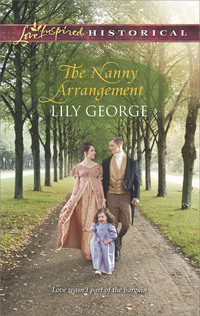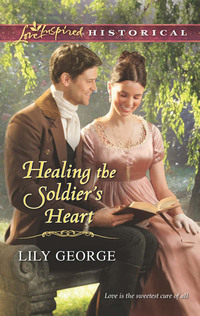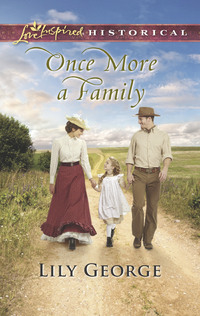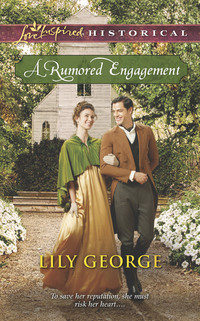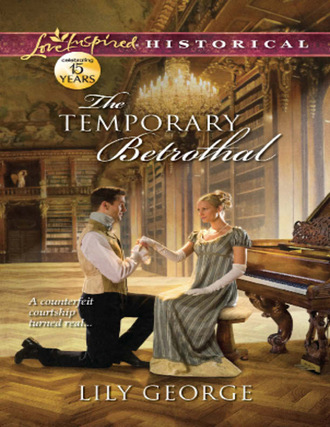
Полная версия
The Temporary Betrothal

From Temporary Engagement to True Love?
Sophie Handley is a charming flirt—just like the fiancée who jilted Lieutenant Charles Cantrill after he was wounded at Waterloo. Yet her assistance in helping veterans is proving invaluable. And when she offers to feign a courtship to appease his family, he finds their arrangement curiously appealing….
Sophie has been groomed from birth for a life of easy comfort. Then financial ruin obliges her to reevaluate all her plans and dreams. Helping veterans and their wives helps her see what’s truly important—and gives her the chance to enjoy the lieutenant’s very appealing company. Somehow Sophie must help his embittered heart to see she’s found her permanent place—by his side, and in his arms.
Sophie patted his arm. “Honestly, Charlie, I am not offended that anyone would think our courtship was real.”
His heart beat faster. Really? Was that so?
“I am a career soldier, but I confess I have no idea how to handle this particular battle. I don’t know how to extricate you without damaging your reputation.”
“Remember who I am? What I am? Fickle and flighty Sophie.” She gave a bitter laugh that wrenched his stomach. “If it comes to that, no one will think anything of it if I break our engagement.”
“I don’t think of you that way,” he muttered. It was the truth. He hated for her to think poorly of herself, when he had seen so much good in her.
She turned toward him, her bright blue eyes glowing. “Don’t you?”
“Not at all. I admire you greatly.” It was difficult to say the words, but something told him she needed to hear it.
She reached up and pecked his cheek. “Oh, Charlie,” she whispered. “That means more to me than all the diamond bracelets in the world.”
LILY GEORGE
Growing up in a small town in Texas, Lily George spent her summers devouring the books in her mother’s Christian bookstore. She still counts Grace Livingston Hill, Janette Oake and L. M. Montgomery among her favorite authors. Lily has a BA in history from Southwestern University and uses her training as a historian to research her historical inspirational romance novels. She has published one nonfiction book and produced one documentary, and is in production on a second film; all of these projects reflect her love for old movies and jazz and blues music. Lily lives in the Dallas area with her husband, daughter and menagerie of animals.
The Temporary Betrothal
Lily George

MILLS & BOON
Before you start reading, why not sign up?
Thank you for downloading this Mills & Boon book. If you want to hear about exclusive discounts, special offers and competitions, sign up to our email newsletter today!
SIGN ME UP!
Or simply visit
signup.millsandboon.co.uk
Mills & Boon emails are completely free to receive and you can unsubscribe at any time via the link in any email we send you.
Bear with each other and forgive one another if any of you has a grievance against someone. Forgive as the Lord forgave you. And over all these virtues put on love, which binds them all together in perfect unity. Let the peace of Christ rule in your hearts, since as members of one body you were called to peace. And be thankful.
—Colossians 3:13–15

For Hoot
Contents
Chapter One
Chapter Two
Chapter Three
Chapter Four
Chapter Five
Chapter Six
Chapter Seven
Chapter Eight
Chapter Nine
Chapter Ten
Chapter Eleven
Chapter Twelve
Chapter Thirteen
Chapter Fourteen
Chapter Fifteen
Chapter Sixteen
Chapter Seventeen
Chapter Eighteen
Chapter Nineteen
Chapter Twenty
Chapter Twenty-One
Chapter Twenty-Two
Chapter Twenty-Three
Chapter Twenty-Four
Chapter Twenty-Five
Chapter Twenty-Six
Dear Reader
Questions for Discussion
Excerpt
Chapter One
March, 1818
Oh, botheration. All the buildings in Bath looked precisely the same. Sophie Handley clutched her bonnet with one hand, clamping it tightly to her curls as she tilted her chin upward. Her intuition fled—she was completely and utterly lost. There was no sign of a haberdashery anywhere on this street. Sophie scoured the directions, written in Mrs. Wigg’s undulating hand, once more. Very well. She had come up Charlotte Street, just as the housekeeper instructed. But then, had she taken a right or a left at George Street? Neither. She’d walked straight ahead—yes, that was the Circus, directly in front of her. So should she retrace her steps? Or keep going toward the Circus?
Something splashed onto her piece of foolscap, smearing the ink. She scanned the swollen clouds in the slate gray sky. Botheration—an afternoon shower. Rain fell in fat drops, dampening the foolscap so that it folded itself limply across her glove. And she had no umbrella. Of course. She’d left it behind, as this was supposed to be a mere dash to secure a few buttons for Lord Bradbury’s daughter’s frock. And yet here she was, lost in the very middle of Bath, with no parasol.
Sophie bit her lip in frustration. She had come to Bath full of purpose and promise, determined to strike out on her own as a seamstress to a wealthy family. And she was coming perilously close to failure, as she could not even go to the shops without getting lost and drenched.
If only there were a way to catch her bearings, but Bath was nothing like home. To find her way in Tansley Village, she had only to note the position of the sun or the moon and then navigate her way across the fields, the sweet moor grass swaying in the gentle breeze. The scrubby hills and valleys were as familiar to her as the face of a dearly beloved friend—but she wasn’t home any longer. She gave her head a defiant toss. She had chosen to leave home and come to Bath. And she had chosen a life as a servant. So she had better find her way to the haberdasher and quickly, and then return home to continue work on Amelia Bradbury’s riding habit.
She turned back down Gay Street. At the intersection she would try heading in the opposite direction. She shouldered past the milling throngs on the sidewalks, wealthy lords and their well-dressed ladies, scruffy children darting to and fro, and servants soberly dressed in black and white. All of them, every man jack of them, seemed to have an umbrella.
Sophie tossed her now-sodden scrap of paper into the gutter and folded her arms across her chest, holding them closely for warmth. She tucked her chin down, so that most of the moisture rolled off the brim of her bonnet. She assumed a casual air of nonchalance, as though she had forgotten her umbrella on purpose, and hastened her steps along George Street. But oh, it was hard to seem collected when a cold droplet of rain worked its way down your neck and under the back of your frock.
She turned the corner of George Street, colliding with something warm and strong. “Oof!”
“I beg your pardon.” Whatever or whomever she had collided with had a lovely baritone voice. “I hope I haven’t injured you, miss.”
“Oh, no.” Sophie righted her bonnet, which was knocked askew by the force of their collision. She turned her head upward, her cheeks hot with embarrassment. “It’s my fault, really. I was hurrying along and paid no heed to where I was going.”
The brick wall straightened, tilting his umbrella back. His face—she knew that face—
“Lieutenant Cantrill?” she gasped. Of course—she knew he lived in Bath. Her sister, Harriet, had told her that much. But she hadn’t seen a familiar face in her two weeks of living in Lord Bradbury’s home, so it was rather disconcerting to see someone she knew after drifting along an unfamiliar landscape for so long.
“Miss Handley?” One eyebrow quirked, and a half smile crossed his face. He was much handsomer than she recalled. In fact, when he was at Harriet and John’s wedding, she hardly noted his presence. But here, on the sodden streets of Bath, he wore the air of a rescuer, a strong and solid presence in a sea of the unknown and strange. He tilted his umbrella over her and offered her the crook of his elbow. “Are you quite all right? Do you need assistance?”
She shook out her wet skirts and took his arm. It was his damaged one, the one he’d lost at Waterloo. Her fingertips brushed against the leather straps that held his artificial forearm to his biceps. His jacket fit snugly over his shattered limb, so that unless she had touched him for herself, she might never have known that he had been injured. Without thinking, she gave his elbow a slight squeeze—so lightly that he might never discern it.
He coughed a bit—so suddenly and so shortly that it might have been to cover a gasp. She didn’t mean to embarrass or discomfit him. Why had she done that, after all? Better to pretend she stumbled a bit and had grasped him for support. She tangled her foot in the soaking-wet hem of her gown and lurched forward ever so slightly, and squeezed his arm once more. “Oh, thank goodness you came to my rescue.” Sophie affected the breezy tone of voice that always caught men’s ears—the lilting and musical cadence that had, since she was a tiny slip of a girl, gotten her everything she wanted. “I am lost and forgot my umbrella. I was at my wits’ end, I assure you.”
“I see.” He steered her through the milling crowd on the sidewalk, managing to set them on a clear path without bumping into a soul or spearing anyone with his umbrella. How extraordinary. She sidled a bit closer, reveling in the feel of being with someone who knew exactly where he was going and precisely how to get there.
He spoke once the mob thinned out. “Where are you going?”
“Well, I was trying to find the haberdasher at the Guildhall Market. The housekeeper wrote out my directions, for I am new to Bath and get lost easily. And it seems I’ve done it again.” She glanced up at his profile. He wore a stern, almost abstracted expression, his firm lips turned downward and his face bent low, as though he were walking against the wind. “Thank goodness for you, sir. I was quite unsure what to do next.” She prepared to flutter her eyelashes and purse her mouth so her dimples would show, but he never looked her way.
“Guildhall Market? That’s a bit of a hike from here. You really did get lost, didn’t you?” Lieutenant Cantrill turned the umbrella so that the pelting rain no longer touched her gown. “I’ll help you find it. Here—let’s turn down Milsom Street. It’s a good cut-through.”
They passed another row of shops—a confectioner’s called Munn’s, a modiste and a shop that sold nothing but cheese. How extraordinary. A cheese shop. At Tansley, if one wanted cheese, one had to go milk the cow. But of course, they couldn’t afford to keep a cow, so they relied heavily on the one shop in the village that kept everything from sugar to foolscap.
They walked in silence as Sophie drank in the sights. She wasn’t jaded yet after two weeks out of the countryside. Everything still retained the crisp edge of newness. Sheltered from the rain and warmed by the lieutenant as he strolled along by her side, Sophie permitted herself to relax the tiniest bit and enjoy their walk.
“It’s very kind of you,” she murmured as he steered her onto another street. She had no idea what this one was called, and would likely forget, anyway. So...why not try to wheedle a smile from her rescuer? “If it’s not too much trouble, Lieutenant.”
“Not at all.” His voice was pleasant but distant. “I live near there, anyway. Was just on my way home.”
“Oh, really? Where do you live?” She maintained her light and breezy tone. He would pay attention to her soon, wouldn’t he? At least dart a glance her way?
“I have a flat on Beau Street. Near Mrs. Katherine Crossley’s flat.” He still spared her no glance, and his tone remained polite but disinterested.
“Aunt Katherine! I had no idea you two lived so close to one another,” Sophie replied with a merry laugh. “She helped me to get this position with Lord Bradbury. I am on my way to pick up a few notions for Amelia Bradbury—I am her seamstress.”
“Yes, your sister wrote that you would be coming to Bath to live here. She mentioned that you might be willing to assist me in my work with the veterans’ group.” Was that a spark of attention in his voice? She must pursue it.
“Yes, of course I will.” He spoke of that charity for indigent soldiers that Harriet was so interested in. Hattie had told her something about it, but she couldn’t remember much. Seeing it had caught the lieutenant’s interest, she pressed on. “Tell me more about it.”
He looked down at her, and a light sparked in the depths of his brown eyes. “Well, I was hoping you and I could work together, as it were. You see, I get on very well with the soldiers, being a fellow comrade in arms. But the widows are reluctant to ask me for assistance. I know they need help, but they cannot bring themselves to ask a man. So I thought perhaps they would feel more comfortable if another woman were there, helping out.”
Work together? “That sounds fine.” While she had his full notice, she flashed her dimples by giving him a slow, easy smile. He straightened and turned away from her, a flush staining his thin cheek. So he was susceptible to flirtation, then? She chuckled inwardly. It was so delightful to be walking with a young man again, smiling and talking playful nonsense rather than working away in her sewing room. She had almost forgotten how fun being a woman could be.
“We’re here. Guildhall Market.” The lieutenant’s voice was cold and remote once more, as though he had shut a door between them. She didn’t like that tone of voice.
“Oh, Lieutenant. Thank you for getting me here safe and sound.” She should release his elbow, but this lieutenant was too much of an enigma to let go—not before she had spent a bit more time in his company. “Do you mind very much waiting for me, and then you can point me in the correct direction back to Lord Bradbury’s house? I am so afraid I will get lost again.”
His jaw muscle set, and his strong, firm lips tightened. Yet when he spoke, his voice was well mannered and courteous. “Of course, Miss Handley.” He strolled with her over to the haberdashers, and bowed as she went in.
As she sorted through the bins to find the perfect set of buttons, she flicked a glance out the streaming windowpane to Lieutenant Cantrill as he stood outside, waiting. He exuded an air of casual power, as one trained as a soldier should. His broad shoulders were encased in a wool jacket that was simply cut but well made. His face was a trifle thin. Did he have a housekeeper who cooked for him? Perhaps one of the ladies at the veterans’ group? She’d have to be an old woman, not young and sweet.... An unreasonable pang of jealousy tore through Sophie, and she shrugged it off.
What did it matter what he ate or wore, or even whom he kept company with? Lieutenant Charlie Cantrill was merely her brother-in-law’s dearest friend. And while she loved flirting with him—she always loved a challenge, after all—’twas no business of hers what the lieutenant did in his spare time.
* * *
Dash it all, Sophie Handley was far prettier than he remembered. When he attended John and Harriet’s wedding a few months ago, Sophie was among the crowd in the chapel and later at the wedding breakfast, but he hadn’t taken careful note of her. Her cheeks were sallow, and her eyes were still glazed with something like shock back then. Probably their mother’s death, which was surely difficult. But still, that creature bore no resemblance to the rosy-cheeked, blue-eyed sylph who gazed up at him as if—well, as if he was a man and she a woman.
He spied her through the window of the shop as she made her few purchases. Even in a sodden calico dress, she was more graceful and attractive than most of the women plodding along the streets of Bath. He shook his head and turned away from the window. Pretty women had always been his downfall. He should have learned his lesson by now.
Mother’s letter rustled in his greatcoat pocket. Ah, a reminder of his familial duties: to find a young girl, marry, have children and give up that ridiculous charitable fund for soldiers. Well, Mother might want him to marry someone like Sophie. But he preferred his life of simplicity and generosity.
And ’twas better to set some distance between him and Sophie Handley, unless he wanted to be made a fool of once more. Since Sophie was his best friend’s sister-in-law, ’twould be disastrous indeed to find himself being led a merry dance by her.
The door of the haberdashery opened, and Sophie stepped out. “Thank you for waiting.” Her voice was lovely. Perhaps she could sing—that would explain her musical tones.
Careful, man. You have your marching orders. Do not become yet another fool.
He offered his elbow once more. “Did you find what you need?”
“Yes.” She waved the parcel triumphantly, heedless of rain. “Perfect buttons, so cunningly made of horn. They will set off the riding habit just so.” She sighed and snuggled against his side as they strolled along. He stiffened and moved a fraction of an inch away from her—not so much as to be discourteous—but they did need boundaries, after all. If Sophie noticed, she said nothing.
He piloted her down Grand Parade Street. Lord Bradbury lived in the Crescent, he was sure, with the rest of the haute monde of Bath. So they had a good quarter of an hour before they reached his door. Charlie sighed inwardly. He didn’t mind the walk so much, but dash it all, it was pouring by now.
Sophie glanced up at the sky and then turned to him. “The heavens have opened.”
He nodded, tightening his lips into a grim line. “So it appears.”
She paused, causing several pedestrians to push round them. “I hate for us both to get soaked, and since you are so close to being home, I can’t ask you to walk me all the way back to Lord Bradbury’s. Shall I take a hackney?” She darted a glance around his shoulder, scanning the street.
He hated to waste money on hackneys, committed as he was to a simple life, but desperate times meant hiring a carriage. Sophie would be drenched by the time they reached her employer’s if they didn’t, and he wasn’t about to let her travel on her own. “We’ll go together. It will be my pleasure.”
He hailed a hackney with his wooden hand—funny how quickly the drivers halted when he used his prosthesis, though how anyone could see it through the driving rain was beyond him. He boosted Sophie inside and gave orders to the driver before climbing in and shutting the door.
Sophie relaxed against the seat, her gold ringlets sparkling with raindrops. They gave her a fairy queen appearance, and he resisted the urge to brush the droplets off with his gloved fingertips. He sat up straight, pressing his back against the cushion, and stared down at the dusty floor. Looking up at her was too dangerous by far.
“Ah, this is so much better. Thank you, Lieutenant.”
He could not look up, so he merely shrugged. “It was your idea, after all.”
“True.” She fell silent, and stared out the window. ’Twas a relief indeed not to have those luminous blue eyes settling on him. Sophie Handley was a most unnerving creature.
He shifted around, and the letter in his pocket crackled once more. When he got back to his flat, he’d throw the dratted thing in the fire. It made a noise every time he moved, and each time it did so was yet another reminder that his family thought him a wretched failure.
“Lieutenant, I cannot help but wonder if something is preying upon your mind. You seem so distracted.” He could no longer resist looking at her—a magnet was drawing him to her. “You helped me. Can I assist you in any way?”
He started to shrug off her offer, but paused. Could Sophie Handley possibly help him out of this mess?
“I—uh.” Charlie coughed, clearing his throat. “I had a letter from home, and it’s all I have been able to think on this morning. Even when I was working with the veterans as I was earlier in the day, my mother’s words have captured my full attention. I apologize that I am so distracted.”
“Not at all, Lieutenant.” Sophie clasped her hands in her lap and regarded him evenly. “Letters from home can be welcome, or they can serve to remind you why you left home in the first place.”
He surprised himself by laughing aloud. How very true that was. And nicely put, too. “Indeed.”
“My sister Harriet’s letters are always so didactic. ‘Do this. Don’t do that.’ I know she means well, but it becomes tiresome to be lectured to in such a fashion.” She smiled, her lips turning up mischievously at the corners, highlighting her dimples once more. “Of course, with a letter, you can always fling it in the fire. This makes it a much more pleasant way to receive lectures than standing there in person, taking orders.”
He chuckled. He had not been able to laugh about his family to anyone except himself in ages. And laughing to oneself was a bitter, hateful thing. Sharing the trials of family life with Sophie warmed his heart—he did not feel so utterly alone anymore. He glanced up at her once more. The droplets of rain had dried on her curls, but she still had that air of starriness about her. Some women just had that gift of grace, and Sophie was one of the lucky few.
She returned his frank regard, tilting her head to one side. “So, Lieutenant, if we are sharing confidences, you might tell me what your mother wrote that has so plagued you. Perhaps, as a fellow sufferer, I can think of a way to help.”
He hesitated. He had never spoken to anyone about his mother and brother’s demands before. Not even his best friend, John Brookes, knew how much animosity existed between himself and his family members. But why not confide in Sophie? He really had no idea what to do with his mother and brother, and Sophie might be able to advise him, especially as one far removed from the family and its dynamics.
He withdrew the letter from his greatcoat pocket and held it, running his thumb over the broken wax seal. “As you might know, I work a great deal with the veterans in Bath. This has been my life’s work since I returned from Waterloo. But my mother and brother both detest the way I live. My mother wants me to marry and have a family. Robert wants me to return to Brightgate and help him with managing all my family’s business affairs.” He sighed, picking at the wax with his thumbnail. “I have no desire to do either. My work is very important to me. I wish they would understand.”
Sophie nodded, her ringlets bouncing. “Yes, I know just how you feel. When I chose to come to Bath and work as a seamstress for Lord Bradbury, Harriet and John were very uncertain of the wisdom of my choice. Fortunately, I was able to convince them both that living at home would in no way make me a more independent person. After Mama died, I wanted to be more than another girl on the marriage mart, looking for a husband. It’s all I was groomed for, but when my family’s fortunes collapsed and Papa and Mama died, I decided I needed to strike out on my own. And so I have.”
The carriage slowed as they turned onto the Crescent. He could just glimpse the well-matched and imposing facades of the most expensive townhomes in Bath—very different from his own two-room flat on Beau Street. Sophie sensed the carriage’s impending halt, and began to gather her things.





